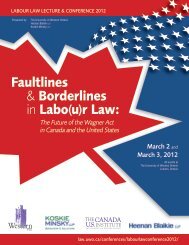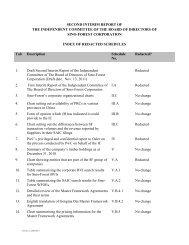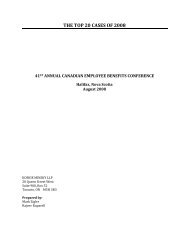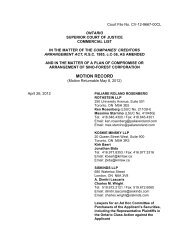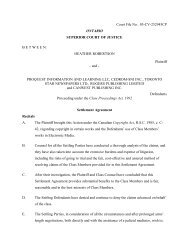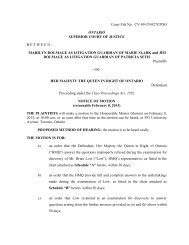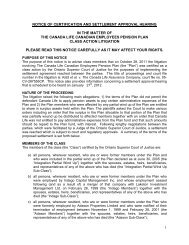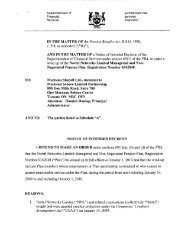Employment News, Spring 2009 - Koskie Minsky LLP
Employment News, Spring 2009 - Koskie Minsky LLP
Employment News, Spring 2009 - Koskie Minsky LLP
You also want an ePaper? Increase the reach of your titles
YUMPU automatically turns print PDFs into web optimized ePapers that Google loves.
<strong>Employment</strong> news<br />
This is a Summary of <strong>Employment</strong> Matters of Interest to the<br />
Business community, from a litigator’s point of view<br />
SPRING <strong>2009</strong><br />
CONTRIBUTORS:<br />
Arleen Huggins, ahuggins@kmlaw.ca<br />
Phone: (416) 595-2115<br />
Nancy Shapiro, nshapiro@kmlaw.ca<br />
Phone: (416) 595-2108<br />
(This Edition's Editor)<br />
Larry Banack, lbanack@kmlaw.ca<br />
Phone: (416) 595-2070<br />
David Rosenfeld,drosenfeld@kmlaw.ca<br />
Phone: (416) 595-2700<br />
Ernie Schirru, eschirru@kmlaw.ca<br />
Phone: (416) 595-2142<br />
Clio Godkewitsch, cgodkewitsch@kmlaw.ca<br />
Phone: (416) 595-2120<br />
ESA MINIMUM TERMINATION CLAUSE ENFORCED – PART I<br />
Employers and employment lawyers alike are always questioning what termination provisions in<br />
contracts will be enforced. The Ontario Court of Appeal has now offered us another example of an<br />
enforceable clause that effectively limits the unfortunate employee's entitlement solely to that required<br />
as the minimum payment by the <strong>Employment</strong> Standards Act, 2000.<br />
The clause reads as follows:<br />
"Termination of <strong>Employment</strong> – Your employment may be terminated<br />
for cause at any time in which event you shall be entitled to only the<br />
amount of your salary and vacation pay earned up to the effective date<br />
of termination. Your employment may be terminated without cause for<br />
any reason upon the provision of reasonable notice equal to the<br />
requirements of the applicable employment or labour standards<br />
legislation. By signing below, you agree that upon the receipt of your<br />
entitlements in accordance with this legislation, no further amounts will<br />
be due and payable to you whether under statute or common law.<br />
[Emphasis added.]"<br />
Rejecting arguments of ambiguity, the Court of Appeal held that the context of the clause considered<br />
as a whole, was clear and unambiguous. In short, the clause was enforceable.<br />
Therefore, the ESA minimum to be the only compensation to which the employee was entitled.<br />
Another employer who breaths a sign of relief that its contracts are enforceable and another employee<br />
who should have negotiated the termination provision of the contract.<br />
Clarke v. Insight Components (Canada) Inc., 2008 (O.C.A), 837<br />
20 Queen Street West, Suite 900, Box 52, Toronto, Ontario M5H 3R3<br />
Tel: 416-977-8353 • Fax: 416-977-3316<br />
www.kmlaw.ca
COURT REJECTS CHALLENGES TO EMPLOYEE’S CLAIM FOR WRONGFUL DISMISSAL<br />
In Andrachuk v. Bell Globe Media Publishing Inc., the plaintiff claimed damages for wrongful dismissal<br />
and discrimination. The claim was challenged by way of motion on the basis that the termination<br />
occurred outside the two year limitation period.<br />
Leslie Andrachuk was a senior level marketing employee who was terminated without cause 11 days<br />
after announcing her pregnancy and intention to take a maternity/parental leave to her employer. A<br />
few months after her termination, a young male employee was hired to fulfill many of her functions.<br />
Seventeen months after Andrachuk’s termination, the same young male employee was promoted to a<br />
position with the same responsibilities that Andrachuk had performed in her former position.<br />
Andrachuk alleges that her termination and replacement with a male employee was based on gender,<br />
age, and pregnancy discrimination.<br />
The defendant brought a motion to determine a question of law before trial, alleging that the plaintiff<br />
failed to bring the action within the applicable 2 year limitation period, and thus the case should not<br />
proceed. The court held that the question of whether there had been a fraudulent concealment of a<br />
sham-reorganization by the employer will determine when the limitation “clock” began to run, which is<br />
a question of fact that could only be determined at trial.<br />
The case has not yet proceeded to trial.<br />
Andrachuk v. Bell Globe Media Publishing Inc. <strong>2009</strong> Canlii 3974 (Ont. S.C.)<br />
ESA MINIMUM TERMINATION CLAUSE ENFORCED – PART II<br />
The Ontario Superior Court of Justice issued a decision in King v. Weber Manufacturing Technology<br />
Inc. which underscores the benefits to be had by employers when they seek legal advice before<br />
issuing offers of employment. The decision also serves as a reminder to employees that they ought to<br />
seek legal advice before accepting any employment offers.<br />
Weber Manufacturing Technology Inc. had recently purchased the company that John King worked<br />
for. As part of this purchase, Weber presented Mr. King with an offer of employment on April 17,<br />
2007. This offer contained specific language that stated that Weber could terminate Mr. King’s<br />
employment "at any time upon giving him the length of notice or equivalent pay in lieu of notice, and<br />
severance pay (if applicable) to which he may be entitled to under the <strong>Employment</strong> Standards Act".<br />
Mr. King signed the offer and returned it to Weber.<br />
A little over four months later, Weber terminated Mr. King’s employment, without cause, by paying him<br />
the statutory minimums set out in the <strong>Employment</strong> Standards Act. Mr. King refused to accept the<br />
payment and instead commenced an action for wrongful dismissal seeking recovery of his common<br />
law damages. Weber brought a motion for summary judgment relying upon the language in its offer of<br />
employment.<br />
The court found that the language in the offer was clear and unambiguous and did away with Mr.<br />
King’s common law claims. It held that Mr. King did not have to “accept” the actual payment of the<br />
statutory minimums from Weber in order for the language in the offer to have any binding effect nor<br />
did it matter that he had not signed back the offer letter.<br />
King v. Weber Manufacturing Technology Inc., [2008] O.J. No. 4033<br />
<strong>Employment</strong> news<br />
SPRING <strong>2009</strong><br />
page 2
SUPREME COURT OF CANADA SAYS COURTS ARE NOT TO RE-WRITE UNREASONABLE<br />
NON-COMPETITION AGREEMENTS<br />
Mr. Shafron was employed by KRG Insurance Brokers Inc. (“KRG”). His employment agreement<br />
included a non-competition clause which restricted Shafron from competing with KRG in the<br />
“Metropolitan City of Vancouver” for a period of 3 years after his employment ended. When Shafron<br />
left KRG he began employment as an insurance salesman in Richmond, British Columbia, a suburb of<br />
Vancouver.<br />
KRG commenced an action against Shafron for, amongst other things, a breach of the noncompetition<br />
clause. The trial judge found that the term “Metropolitan City of Vancouver” was unclear,<br />
uncertain and unreasonable on the basis that this term did not have any accepted meaning and<br />
refused to enforce it. While finding that the term was ambiguous, the Court of Appeal nevertheless<br />
overturned the trial judge’s ruling as the court read the term to include the City of Vancouver, the<br />
University of British Columbia Endowment Lands, Richmond and Burnaby, by applying the doctrine of<br />
severance to rectify the ambiguity in the clause. The doctrine of severance refers to the reading down<br />
of an illegal provision in a contract to make it legal and enforceable.<br />
The Supreme Court of Canada (“SCC”) overturned the Court of Appeal’s decision. The SCC<br />
reaffirmed the view that non-competition agreements which have the effect of retraining a person’s<br />
trade will only be enforced if they are reasonable and will require rigorous scrutiny in the employment<br />
context. In determining whether such a clause is reasonable, the clause itself must be unambiguous.<br />
The SCC held that the doctrine of severance has no place in the interpretation of employment<br />
contracts as its application would amount to the courts re-writing covenants in a manner they sought<br />
fit and as it would give employers the incentive to draft overly broad restrictive covenants with the<br />
prospect that the courts will read them down to what it thinks is reasonable, both leading to<br />
uncertainty. It held the clause to be unenforceable.<br />
This case should be a reminder to employers that courts will not easily enforce non-competition<br />
clauses and other restrictive covenants in restraint of trade in employment agreements. Such<br />
covenants will be rigorously reviewed by the courts and will not be read-down or re-written to make<br />
them enforceable. Clear wording of the scope of such covenants will be required for them to be<br />
enforced.<br />
Shafron v KRG Insurance Brokers (Western) Inc., [<strong>2009</strong>] O.J. No. 6<br />
EMPLOYEE’S CLAIM FOR 3,300 HOURS OF OVERTIME GIVEN JUDGMENT OF $1.00<br />
In Matiowski v. Lake of the Woods Business Incentive Corp., the plaintiff employee sued his former<br />
employer for payment of 3,300 hours of overtime worked by him between January 2000 and May 31,<br />
2006.<br />
Matiowski was terminated by Lake and claimed that Lake knew he was accumulating overtime and<br />
repeatedly encouraged him to do so but failed to compensate him.<br />
Although the court found that Lake had breached Ontario’s <strong>Employment</strong> Standards Act by failing to<br />
keep proper records of overtime worked and failing to pay Matiowski for his unused overtime within<br />
the time limits set out in the legislation, the court only granted Matiowski $1.00 in damages.<br />
<strong>Employment</strong> news<br />
SPRING <strong>2009</strong><br />
page 3
The court held that the employee had the onus to prove the number of overtime hours he worked and<br />
his evidence was unreliable. The employee knew that his employer was not tracking his overtime, yet<br />
his evidence consisted of a household calendar which proved to be inaccurate and based on<br />
estimates.<br />
The court stated that it: “…cannot accept speculation or guesses but must receive evidence that has<br />
sufficient validity on which to found its judgment.”<br />
The nominal damage award of $1.00 was to "serve as a declaration of the plaintiff's rights and a minor<br />
deterrent to the defendant."<br />
In awarding costs, the court granted Matiowski $15,000 in costs plus $4,281 in disbursements. This<br />
was despite Lake’s pre-trial formal offer to settle in the amount of $15,000.00. The costs award was<br />
reflective of Mr. Matiowski’s years of hard work for Lake and Lake’s assurances that his overtime<br />
would be looked after.<br />
In the circumstances, the court found that it would be unconscionable and punitive to adhere to the<br />
provisions of Rule 49 or to make a no costs award as advocated by Lake.<br />
Matiowski v. Lake of the Woods Business Incentive Corp. [2008] O.J. No. 4179; and [2008] O.J. No. 5101<br />
This edition of <strong>Employment</strong> <strong>News</strong> has been sent to you either via ordinary mail or email. Should you<br />
at any time wish to change your preferred method of receipt of this <strong>News</strong>letter, please take the time to<br />
either reply to this email or return this page to us indicating your selected method of delivery. Please<br />
also provide us with any change to your contact information to ensure continued receipt.<br />
I prefer to receive <strong>Employment</strong> <strong>News</strong> by mail at:<br />
I prefer to receive <strong>Employment</strong> <strong>News</strong> by email at:<br />
Name:<br />
Firm/Company:<br />
Please return to Uma Ratnam by fax: (416) 204-2897, or mail to <strong>Koskie</strong> <strong>Minsky</strong> <strong>LLP</strong>, 20 Queen St. W.,<br />
Suite 900, Toronto, Ontario, M5H 3R3<br />
Further please note, profiles of this newsletter’s editors, past issues of <strong>Employment</strong> <strong>News</strong>, as well as<br />
our other firm newsletters, may be viewed on our website at www.kmlaw.ca<br />
<strong>Employment</strong> news<br />
SPRING <strong>2009</strong><br />
page 4




